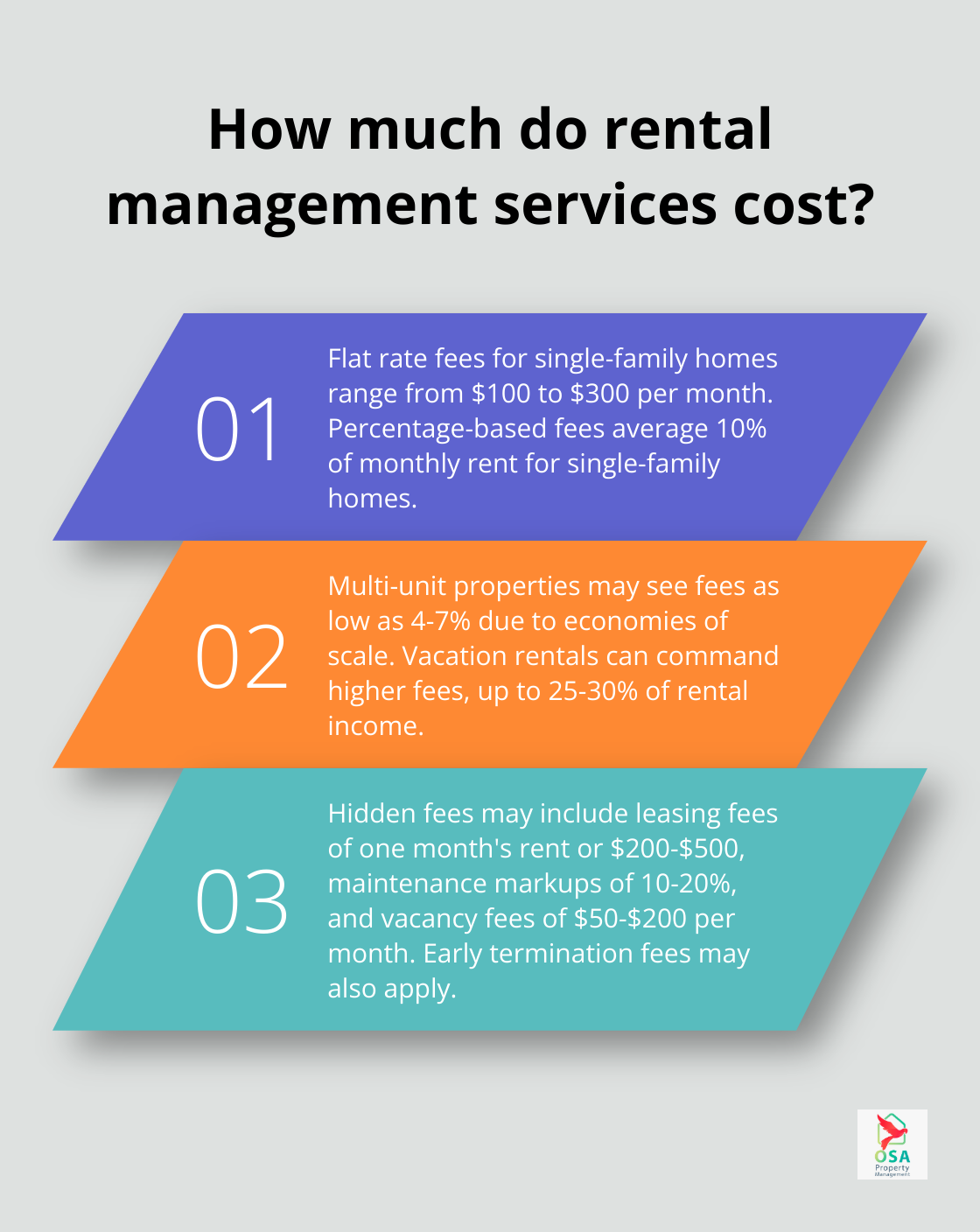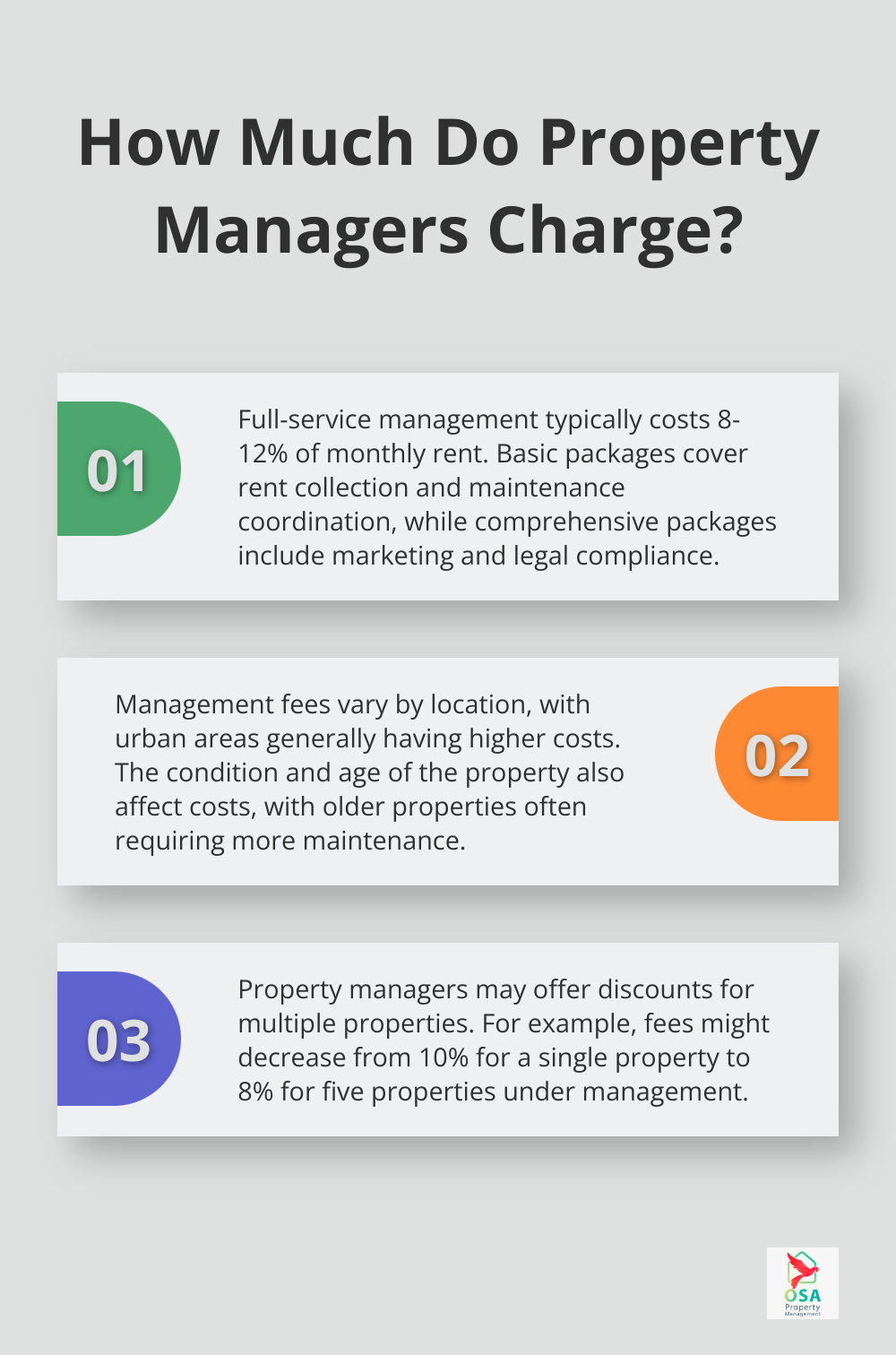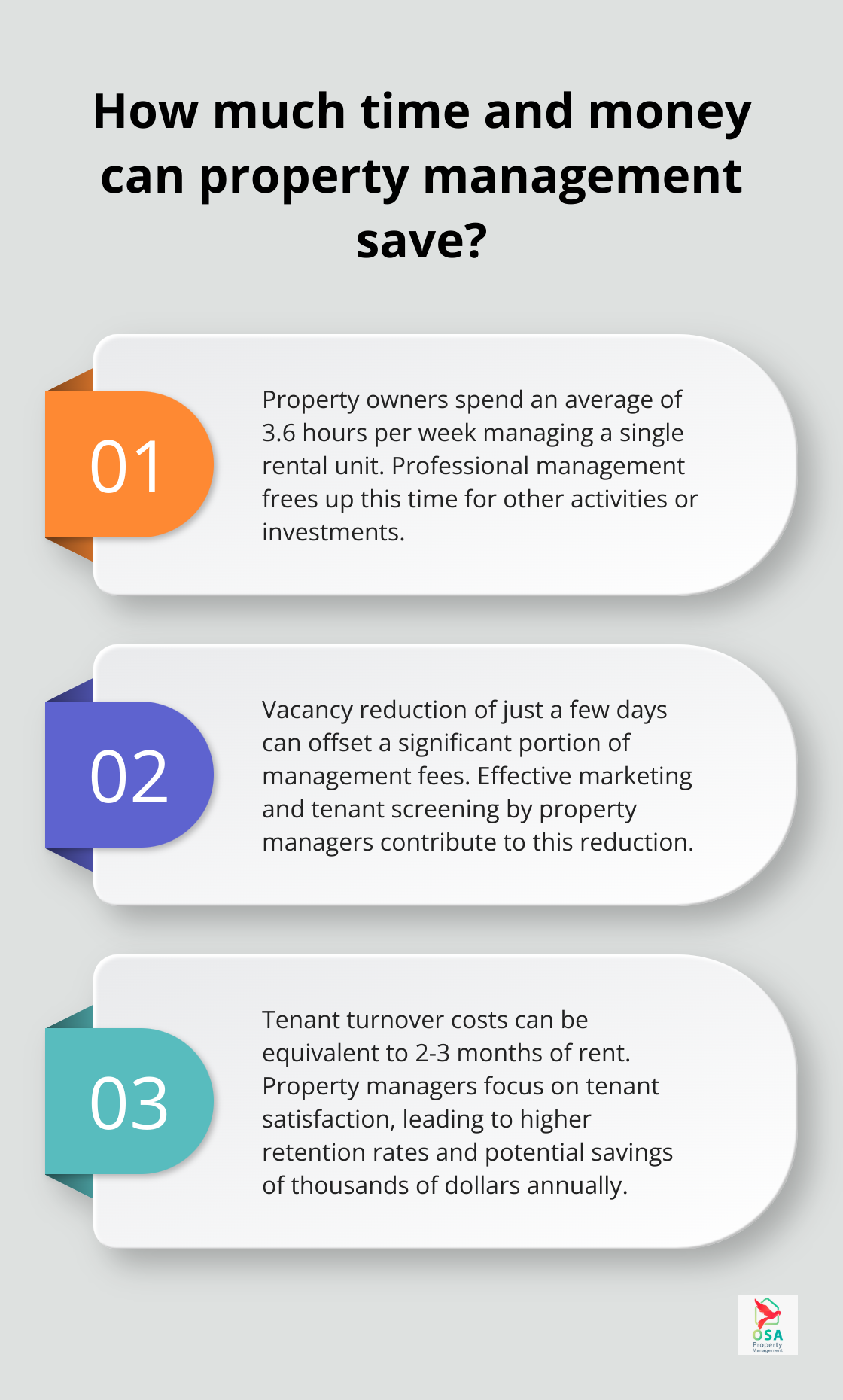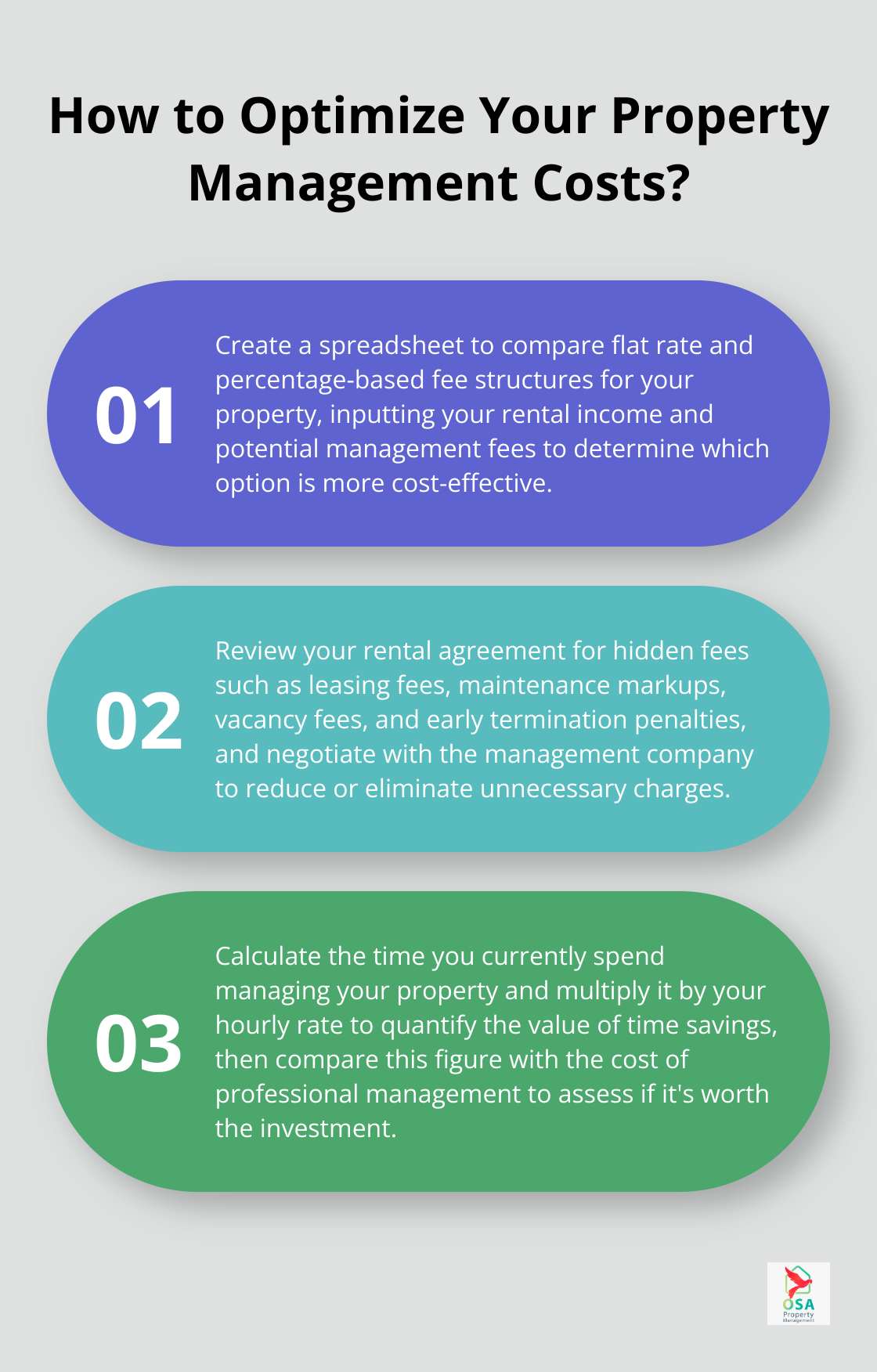At Osa Property Management, we often hear property owners ask about rental management costs. It’s a crucial question for anyone considering professional property management services.
In this post, we’ll break down the various factors that influence rental management cost and help you understand what you’re really paying for. We’ll also explore how to evaluate the true value of these services beyond just the price tag.
What Are Rental Management Fee Structures?
Flat Rate vs. Percentage-Based Fees
Rental management companies typically offer two main fee structures: flat rate and percentage-based. Flat rate fees involve a set amount charged monthly, regardless of the rental income. Property owners with high-value properties often prefer this structure. For instance, a flat rate might be $100 to $300 per month for a single-family home.
Percentage-based fees calculate as a portion of the monthly rent collected. The National Association of Residential Property Managers (NARPM®) provides resources for residential property management professionals who desire to learn, grow, and build relationships. This structure aligns the management company’s interests with the property owner’s, as both parties benefit from higher rental income.

Some companies offer hybrid models that combine elements of both structures to suit specific owner needs.
Average Costs Across Property Types
The cost of rental management varies significantly based on property type. Single-family homes typically incur lower fees compared to multi-unit buildings or vacation rentals. A study by Real Property Management found that the average management fee for a single-family home is about 10% of the monthly rent, while multi-unit properties might see fees as low as 4-7% due to economies of scale.
Vacation rentals often command higher fees (sometimes up to 25-30% of the rental income) due to the increased workload of frequent turnovers and marketing efforts.
Hidden Fees to Watch Out For
While base management fees are straightforward, property owners should remain vigilant about additional charges. Common hidden fees include:
- Leasing or tenant placement fees: Often one month’s rent or a flat fee between $200-$500.
- Maintenance markup: Some companies add a percentage to maintenance costs (typically 10-20%).
- Vacancy fees: Charges for managing an empty property, which can range from $50-$200 per month.
- Early termination fees: If you end the contract prematurely, you might face penalties.
Property owners should carefully review their management agreements and ask for a comprehensive fee schedule before signing.
The Value Proposition of Rental Management
While cost is an important factor, the value provided by a management company should be the primary consideration. Professional property management can increase your rental income through optimizing rental rates, effective marketing, and tenant screening.
As we move forward, it’s essential to understand the various factors that can affect these rental management costs. Let’s explore how property location, condition, and other elements play a role in determining the final price tag for professional property management services.
What Drives Rental Management Costs?
Location Impact
The location of your rental property significantly influences management costs. Urban areas with higher living costs typically result in increased management fees due to elevated operational expenses. For example, managing a property in San José, Costa Rica, might cost more than in a smaller town like Uvita. This difference stems from variations in local wages, transportation costs, and the overall cost of doing business.
Property Condition and Age
The condition and age of your property directly affect management costs. Older properties or those in poor condition often necessitate more frequent maintenance and repairs, which can increase management fees. Regular upkeep and preventative maintenance help keep these costs down over time.
Scale of Management
The number of units under management impacts your costs. Many management companies offer discounts for multiple properties or units. You might pay 10% for a single property, but only 8% if you have five properties under management. This economy of scale can lead to significant savings for owners with larger portfolios.
Service Package Inclusions
The scope of services included in your management package greatly influences the cost. Basic packages might cover rent collection and maintenance coordination, while comprehensive packages could include everything from marketing to legal compliance. Full-service management typically costs 8-12% of monthly rent, while more limited services might cost less.
Market Dynamics
Local market conditions and competition among property management companies affect pricing. In areas with high demand for rental properties, management fees might increase due to increased workload. Conversely, in markets with many management companies, competition might drive prices down. Research and compare options in your specific market to find the best value.

The complexity of factors affecting rental management costs highlights the importance of choosing a management company that understands your specific market and property needs. A company with local expertise (like Osa Property Management in Costa Rica) can offer tailored services that balance cost-effectiveness with comprehensive management. As we move forward, let’s examine how to evaluate the true value of rental management services beyond just the price tag.
Is Rental Management Worth the Cost?
Time Savings and Stress Reduction
Property owners often underestimate the hours required for effective property management. The National Association of Residential Property Managers reports that landlords spend an average of 3.6 hours per week managing a single rental unit. For those with multiple properties or full-time jobs, this time commitment can be substantial.

Professional management takes over time-consuming tasks like tenant screening, rent collection, and maintenance coordination. This allows property owners to focus on other investments or enjoy more free time. The stress reduction that comes with knowing your property is in capable hands proves invaluable for many owners.
Maximizing Rental Income
Experienced property managers have the market knowledge and tools to optimize rental rates. They conduct thorough market analyses to ensure your property is priced competitively while maximizing your income.
Additionally, property managers use effective marketing strategies to reduce vacancy periods. They have access to multiple listing services and a network of potential tenants, which can significantly decrease the time your property sits empty. Even a reduction of just a few days in vacancy time can offset a substantial portion of management fees.
Tenant Quality and Retention
Professional property managers excel at tenant screening, which is important for long-term property success. They have established processes to verify income, employment, and rental history, reducing the risk of problematic tenants. Better tenants mean fewer issues, less property damage, and more consistent rental income.
Moreover, good property management companies focus on tenant satisfaction, which leads to higher retention rates. The cost of tenant turnover can be significant (often equivalent to 2-3 months of rent) when considering vacancy time, cleaning, and marketing expenses. By keeping quality tenants happy and in place longer, property managers can save owners thousands of dollars annually.
Legal Compliance and Risk Mitigation
Navigating the complex landscape of landlord-tenant laws and property regulations can be daunting. Professional property managers stay up-to-date with local, state, and federal regulations, ensuring your property remains compliant. This expertise can prevent costly legal issues and fines.
For example, in Costa Rica (where Osa Property Management operates), there are specific rules regarding rental agreements, security deposits, and tenant rights. Familiarity with these laws protects property owners from potential legal pitfalls that could result in significant financial losses.
Final Thoughts
Rental management costs typically range from 8% to 12% of monthly rent for comprehensive services, with variations based on property type, location, and management scope. The true worth of rental management extends far beyond the price tag. Time savings, stress reduction, and expert handling of legal complexities directly impact your quality of life as a property owner.

The potential for increased rental income, reduced vacancy rates, and improved tenant quality can often offset the cost of management services. When selecting a rental management company, prioritize those with local expertise, transparent fee structures, and a track record of success. It’s wise to inquire about their tenant screening processes, marketing strategies, and maintenance networks.
At Osa Property Management, we understand the unique challenges of property management in Costa Rica. We offer tailored solutions that balance cost-effectiveness with comprehensive care for your investment (in areas like Tarcoles, Jaco, and Uvita). Our team strives to enhance your property’s value and secure your peace of mind.

